This article needs additional citations for verification. (August 2023) |
จุฬาลงกรณ์มหาวิทยาลัย | |
 Phra Kiao, Chulalongkorn University Seal | |
Former names |
|
|---|---|
| Motto |
|
Motto in English |
|
| Type | Autonomous public university |
| Established | 26 March 1917 |
| Founder | King Vajiravudh |
Academic affiliation | ASAIHL, AUN, APRU, Washington University in St. Louis McDonnell International Scholars Academy[1] |
| Budget | 5,535 million baht (FY2019) |
| President | Wilert Puriwat |
| Students | 37,626[2] |
| Undergraduates | 26,202[2] |
| Postgraduates | 8,029[2] |
| 2,627[2] | |
| Location | , Thailand 13°44′18″N 100°31′56″E / 13.738359°N 100.532097°E |
| Campus | Downtown 2.0944 km2 (0.8087 sq mi) |
| Anthem | "Maha Chulalongkorn" ("Great Chulalongkorn") |
| Colours | Pink |
| Mascot | Samanea saman |
| Website | chula.ac.th chula.ac.th/en |
 | |
Chulalongkorn University (CU, Thai: จุฬาลงกรณ์มหาวิทยาลัย, RTGS: Chulalongkon Mahawitthayalai), nicknamed Chula (Thai: จุฬาฯ), is a public autonomous research university in Bangkok, Thailand. The university was originally founded during King Chulalongkorn's reign as a school for training royal pages and civil servants in 1899 (B.E. 2442) at the Grand Palace. It was later established as a national university in 1917, making it the oldest institute of higher education in Thailand.[3]
During the reign of Chulalongkorn's son, King Vajiravudh, the Royal Pages School became the Civil Service College of King Chulalongkorn. The Rockefeller Foundation[4] was instrumental in helping the college form its academic foundation.[5][6] On 26 March 1917, King Vajiravudh renamed the college "Chulalongkorn University".[7]
Chulalongkorn University is one of the National Research Universities and supported by the Office of Nation Education Standards and Quality Assessment of Thailand. Moreover, CU is the only Thai university which is a member of Association of Pacific Rim Universities (APRU).[8]

CU is composed of nineteen faculties, a School of Agriculture, three colleges, ten institutes and two other schools. Its campus occupies a vast area in downtown Bangkok. Graduates customarily receive their diplomas from the King of Thailand, a tradition begun by King Prajadhipok.
- ^ "McDonnell International Scholars Academy".
- ^ a b c d Office of the Registrar, Chulalongkorn University. Statistics on Students in Different Level Archived December 1, 2017, at the Wayback Machine. Last updated May 21, 2018
- ^ "CU History". Archived from the original on October 8, 2016. Retrieved September 28, 2016.
- ^ Becker, William H. Innovative Partners The Rockefeller Foundation and Thailand. New York: The Rockefeller Foundation, 2013. William H. Becker. "Assets: Rockefeller Foundation" Rockefeller Foundation. 2013. https://assets.rockefellerfoundation.org/app/uploads/20131001203515/Innovative-Partners.pdf Archived December 20, 2016, at the Wayback Machine (29 November 2106).
- ^ "CU History". Archived from the original on October 8, 2016. Retrieved December 10, 2016.
- ^ "Thailand's 'Father of Modern Medicine'". News. January 23, 2014. Retrieved December 10, 2016.
- ^ Chulalongkorn University official website. CU History Archived October 8, 2016, at the Wayback Machine. Retrieved January 15, 2016.
- ^ "Association of Pacific Rim Universities - Member Universities". apru.org. Archived from the original on September 4, 2017. Retrieved September 19, 2017.